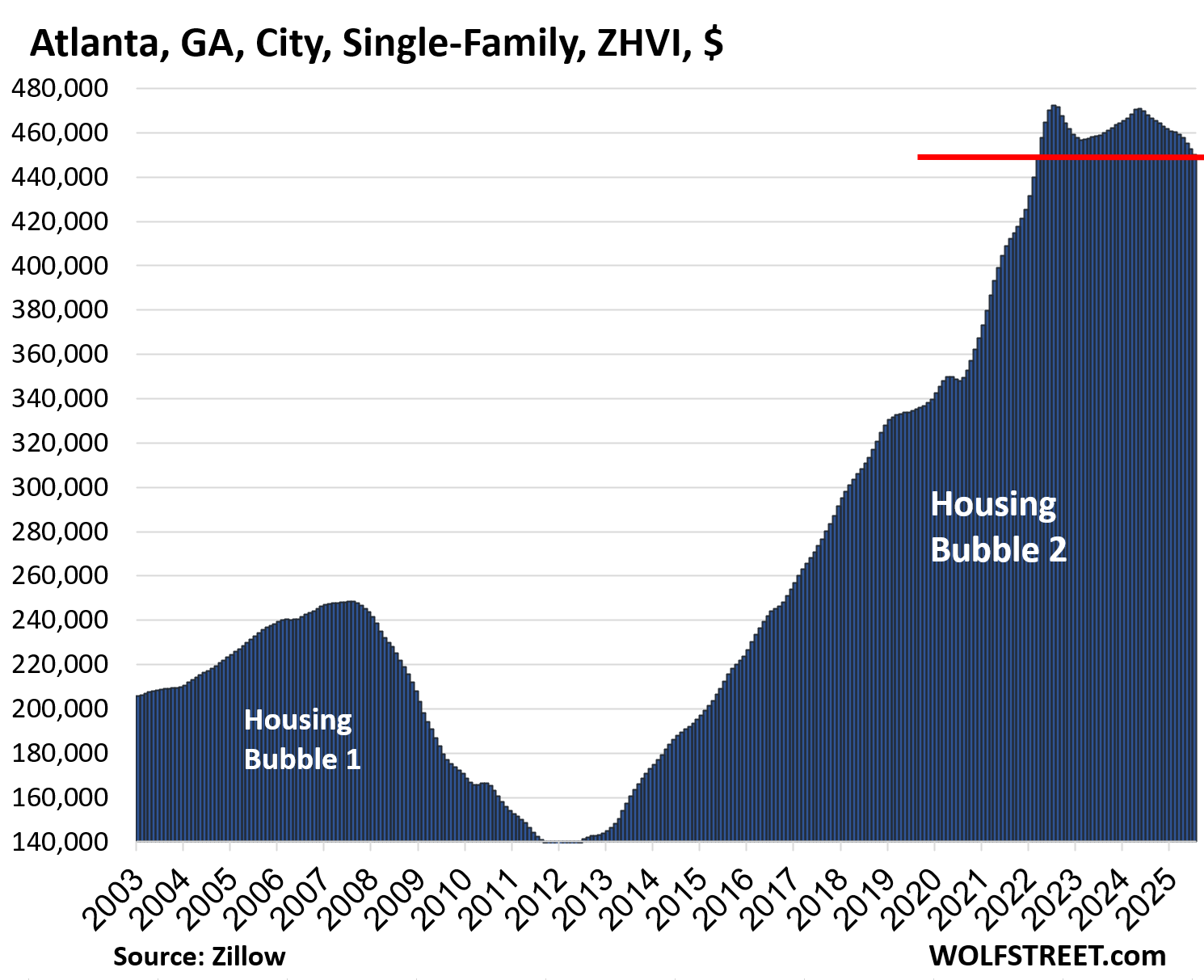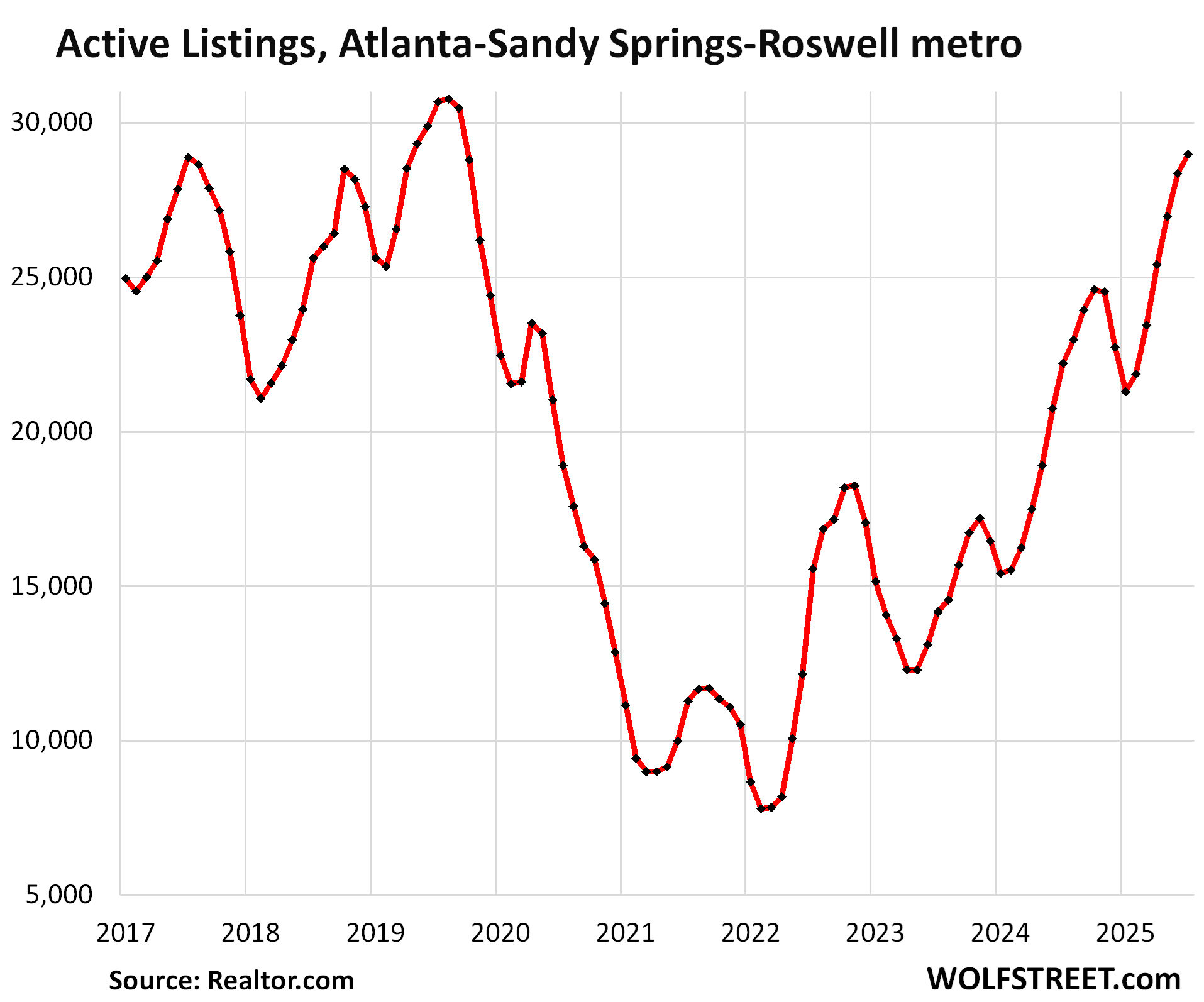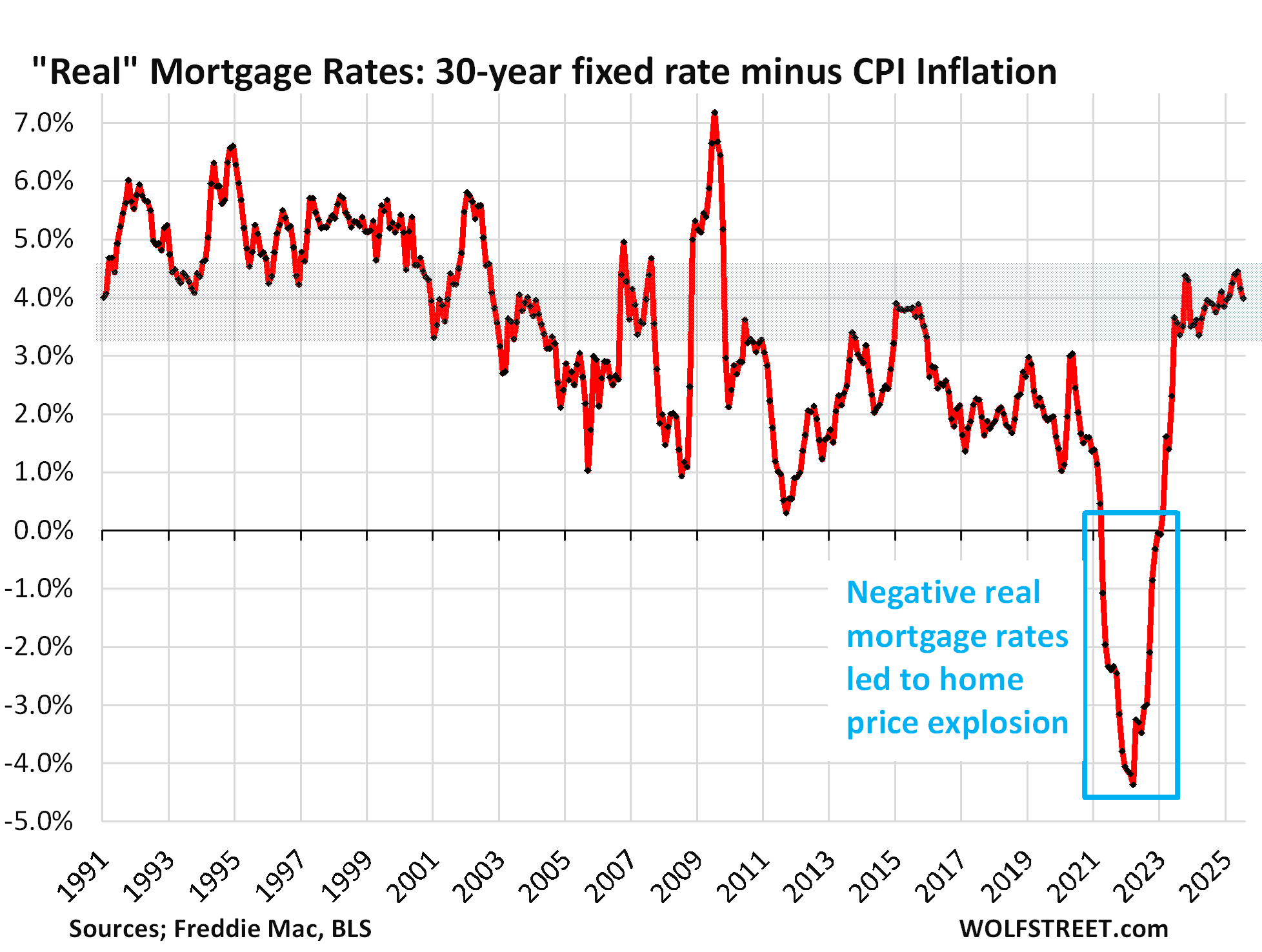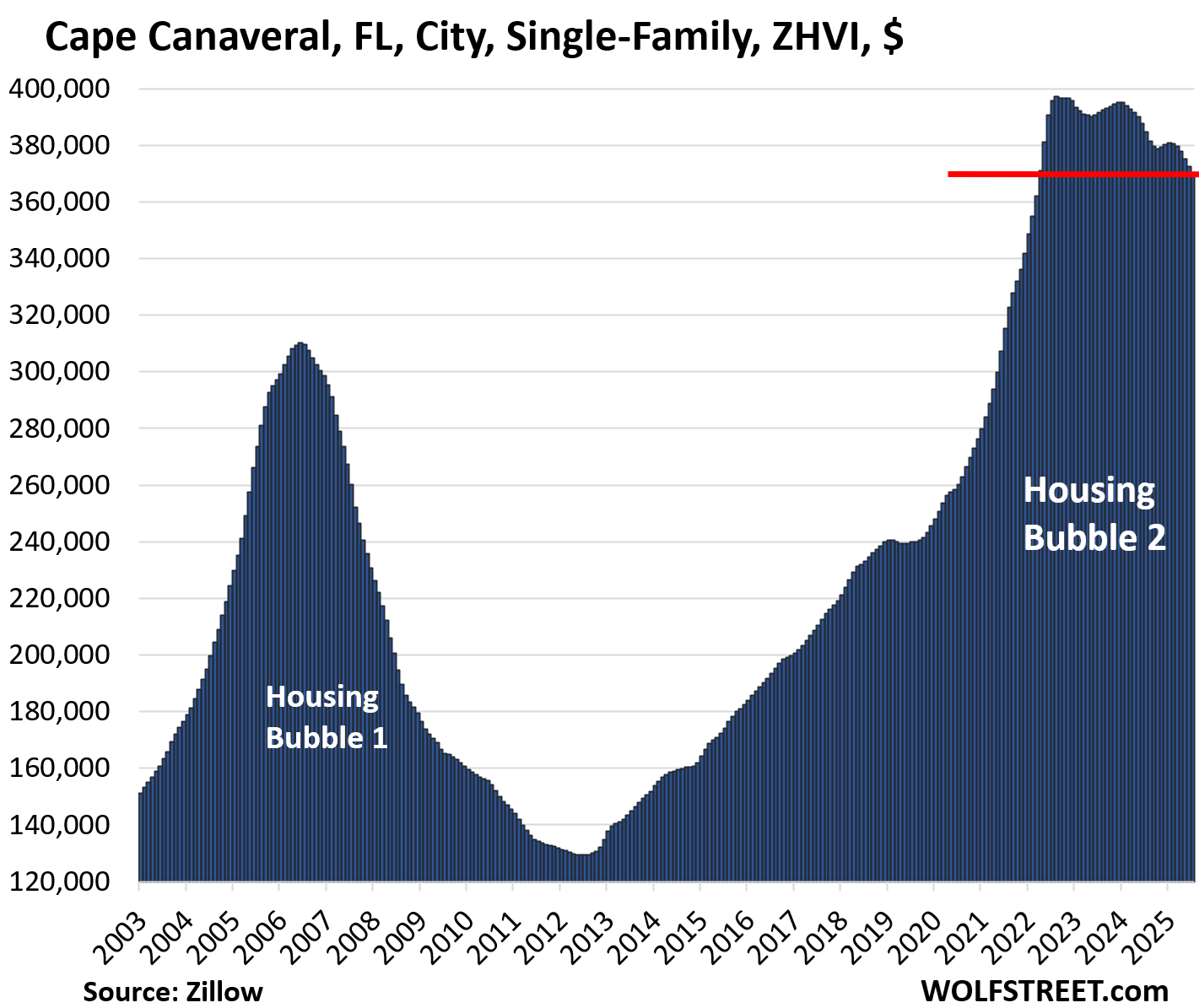How the fucking banksters and the politicians screwed us over. They still are, and blaming everything but themselves. And you idiots continue to vote for the liar politicians.
Stories of Homeowners Hit by Fallout from the Housing Bubble & 3% Mortgages Replace Breathless Media Hype of Bidding Wars
by Wolf Richter • Sep 8, 2025 • 0 Comments
Turns out, free money is a toxin. And now the housing market has cancer.
By Wolf Richter for WOLF STREET.
The WSJ had two anecdotal stories back-to-back about the fallout from the housing bubble and from the artificially repressed mortgage rates.
A story today about a chap in Atlanta who’d bought at the peak in mid-2022. A year ago, he put his home on the market at a price well above his purchase price, perhaps on the notion that prices always go up. Two price cuts later to below his purchase price, he still hasn’t had a single offer, even as expenses are racking up. He is learning the hard way: He who panics first, panics best.
And a story over the weekend about a divorced couple with young children whose big problem is the below-3% mortgage that they refinanced into, and that now forces them to live together, as a divorced couple, because… well, they could sell because they have massive but shrinking gains in their house that they bought in 2017, but they then cannot buy two houses, after price exploded due to the low mortgage rates, and they don’t want to rent.
Similar stories and lamentations have cropped up in other publications and in the social media. And they have replaced the breathless hype about bidding wars that were in part responsible for FOMO — this fear of missing out that leads to hasty decisions.
The hapless chap in Atlanta had bought the 1,600 square-foot house in mid-2022 for $399,000, the WSJ said. He signed the contract within two days of looking at the house and waved the inspections, which came to haunt him with a sewage pipe repair.
Prices in the city of Atlanta peaked in mid-2022, after having spiked by 38% in two years and by 52% in four years, and it didn’t occur to the real estate professionals who extracted lots of money from this deal, to warn the chap that such a historic price explosion, caused by the Fed’s reckless monetary policies, might end in tears.
Instead, they did what they could to fuel his FOMO, including feeding the media an endless series of hype that the media turned into clickbait about bidding wars and what not, and this chap fell for it.
And his costs are racking up. There is the monthly nut of $2,950, which includes mortgage payment, homeowner’s insurance, utilities, and lawn care, compared to $1,200 when he was renting. In addition, there was a $13,000 bill to fix that sewage pipe that hadn’t been connected, which a proper inspection might have found.
Prices of single-family homes in Atlanta have since then skidded lower by about 5%, most of it over the past 12 months, according to the Zillow Home Value Index. And price declines have been accelerating in recent months.

The chap then decided to rent again to shed the costs and “headaches” of homeownership and save some money. He put the house on the market at $430,000 a year ago, and then cut the price twice and is now asking $387,500, below his purchase price in mid-2020 of $399,000, and still hasn’t had a single offer.
Here is the inventory situation in Atlanta that he is facing:

He who panics first, panics best.
He should have listed it a year ago at $387,500 and would have been able to sell it at the time, and maybe for a little more, but the real estate industry had polluted his mind with the mantra that prices only go up, and he couldn’t grasp that he was being manipulated to enrich others when he bought in a fit of FOMO.
He told the WSJ that he might need to drop the price again. That’s a good bet, given that he has had no offers. He is making a classic move: chasing the price down. By the time he adjusts his asking price down further, reality will have moved away from him again.
So now, depending on where he is on his mortgage, and how much longer he chooses to dilly-dally around, he may have to come to the closing with some cash.
The Richmond Fed described this issue in its Beige Book for August: “A North Carolina agent said, “it feels like we are living in two markets, those listing at the right price or those listing like it is 2021.”
This prices from yesteryear are a widespread problem and in part responsible for the plunge in sales volume and soaring inventories.
The fallout from the most reckless Fed ever.
The below-3% mortgages – and even below 5%-mortgages – were a product of the most reckless Fed ever when it repressed interest rates from early 2020 through early 2022, with massive amounts of QE and 0% policy rates.
As a result, in 2021 and into 2022, CPI inflation was spiking and reached levels far higher than the repressed mortgage rates. In other words, “real” mortgage rates (inflation-adjusted mortgage rates) were massively negative. It was, or seemed, better than free money, and when money is free, price doesn’t matter, and home prices exploded.
Turns out, free money is a toxin, and now the housing market has cancer, and the treatment is painful.

And now there are stories of the fallout from the below-3% mortgages cropping up in the media. In the WSJ’s story, a couple with young children finalized their divorce in April but decided, because they have a below-3% mortgage they refinanced into, that they have to to live together but separate: he in the house and she in their Airstream trailer in the backyard, with an outdoor shower – luckily, in Florida, not in Minnesota.
They’re part of that lock-in phenomenon because of that mortgage and because home prices have spiked so much due to those mortgage rates.
Luckily again, they bought the house in 2017 for about $265,000. Prices of single-family homes in Cape Canaveral peaked in mid-2022 and have since then declined by 7%. But in the two years to the peak, prices exploded by 54%. And despite the price declines since that peak, prices are still up by 77% from 2017, when the couple bought the house.
So unlike the chap in Atlanta, they could obviously price their house aggressively and sell for it for a still very substantial gain after prices had exploded by 77% since 2017. But what they then cannot do is buy two houses because prices had exploded by 77% since 2017, and mortgages are now back in the normal-ish range. And renting is not an option for them.
Meanwhile, as they go through their daily arrangements, home prices in Cape Canaveral continue to skid lower, by another 0.7% in July.
 |








